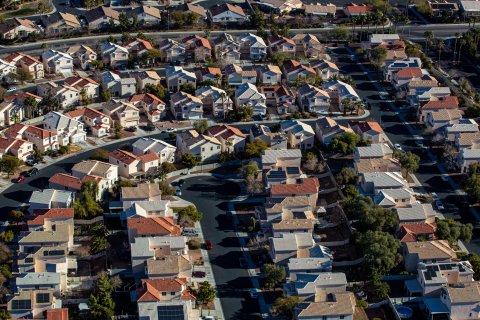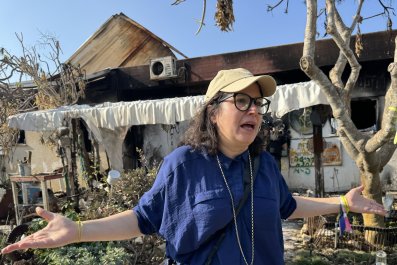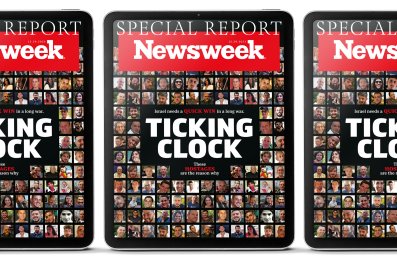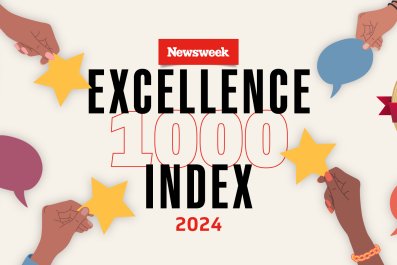Middle-class households are being priced out of the housing market amid high mortgage rates and spiking prices, making it increasingly difficult for them to build wealth. Some financial experts say it's an environment that could lead to the end of the American middle-class dream of owning a home.
For most Americans, owning a home is key to their vision of success. It can help families create financial platforms for future generations to build on. But about 75 percent of homes currently on the market are out of reach for those in the middle class, according to the National Association of Realtors.
Interest on home loans is the highest it's been since the early part of the century, hovering around 7 percent. They have soared as the Federal Reserve has aggressively hiked rates to battle inflation. Meanwhile, the supply of homes has dwindled due to a combination of underbuilding and sellers who are sitting out the market, unwilling to give up low rates they secured in years past, which in turn has pushed up prices.
This dynamic, analysts say, has made buying a home the most expensive it's been this century. Down payments are higher, monthly mortgage payments are exorbitant and few affordable options exist for middle-class Americans.
"The biggest asset most people are ever going to own is a home," Nicole Bachaud, a senior economist at Zillow told Newsweek. "Homeownership is really that financial key that helps unlock stability and wealth preservation across generations."

Simply making mortgage payments adds to the wealth of households every month, economists say.
"Buying [a] home essentially forces you into [a] savings plan," Danielle Hale, the chief economist at realtor.com, told Newsweek. "When you pay your mortgage, you're paying down some of the debt. You are paying off the principal of the mortgage, and then you are also paying off the interest."
By becoming homeowners, people become their own landlords, Hale said.
"You are paying yourself first, and data suggests it's a good way for people to build up wealth slowly over time," she told Newsweek.
Jessica Lautz, deputy chief economist at National Association of Realtors, pointed out that a typical homeowner has nearly $400,000 in housing wealth compared to about $10,000 for a renter.
"So we know that it is a wealth-building tool," she said.
Homes Out of Reach for Middle Class
But a lot of middle-earning Americans are finding that owning home is beyond their means.
Danny Young, a 38-year-old resident of Culver City, California, told Newsweek that he had been looking to buy a home but found the market too expensive.
Prior to the COVID-19 pandemic, his local credit union said he could gain approval for a $750,000 home loan. But that was not quite enough to afford a single-family home near where he lives, where properties are upwards of $1million to $1.5 million.

He estimated that a three-bedroom unit with two and a half bathrooms, sizeable enough for him, his wife Sara, 34, their 9-month-old daughter, Leah Jane, and 10-year-old rescue dog, Robbie, would cost them close to $10,000 in monthly mortgage payments at current rates.
"To be honest, things are so out of scale for what we could really afford," he said in an interview.
Young works as a 3D animator in the entertainment industry and said his income ranges between $80,000 to $130,000 as the film and television can be volatile. Young recently lost his job amid the recent strikes in the business, he said.
He said even if he could find a house for $750,000, he could barely afford it.
"Say, I am paying four grand a month in housing costs, which I guess on paper I could afford, it's so right up against where I would be in trouble," he told Newsweek. "If I lose my job unexpectedly, like just happened, now I am out [a] minimum six grand a month, probably, in living expenses."
"The risk of losing my job and how quickly I would be ruined is like almost not worth it, you know what I mean?" he said.
Young is just one example of scores of Americans who want to own a home but are unable to.
Most people making a median annual salary of $75,000, which is what 51 percent of Americans earn, can afford a home that costs about $256,000, research from the National Association of Realtors and realtors.com from earlier this year showed. However, the median home price in the United States is $431,000, according to Federal Reserve Economic Data.
"We have a housing shortage across the board," realtor.com's Hale said. "But the most acute shortage is really in the middle-income and lower-income tiers."
And even if enough homes were available for, monthly payments have also gone up, compared to even a year ago.
Recent analysis by Oxford Economics showed that a median priced home was now 13 percent more expensive for a median sized income. In the third quarter of 2023, a median sales price of a house at $431,000 cost $12,500 more from the previous quarter, according to data from the Federal Reserve Bank of St. Louis.
"It is difficult for someone to purchase a home who may be looking at more affordable price points with a more modest income," NAR's Lautz said.
Homeowners Insurance Delivers A Blow
High prices and larger mortgage payments are only part of the reality of the housing market for buyers.
The cost of insuring homes has also soared in recent years, adding another wrinkle for prospective buyers in their quest for an affordable home. Home insurance prices are 35 percent higher in the U.S. compared to two years ago, according to digital insurance market Policygenius, on the back of increased climate change-related disruptions across the country.
This, plus property taxes that have gone up as home prices have increased, makes affording a home that much more difficult for middle-income Americans.
"Increases in their insurance premiums year to year because of climate risk that we're seeing in the housing market right now, that's a big cost that a lot of households are going to have a hard time being able to afford and absorb," Zillow's Bachaud pointed out.
Mortgage Rate Drop Brings Hope
Over the past month mortgage rates have softened, providing hope that the cost of borrowing for a home may start to fall. At one point in October rates hit 8 percent, a level not seen since the early 2000s.
The 30-year fixed rate mortgage fell to an average of about 7 percent for the week of ending on December 7, a drop of nearly one percent from a little over a month ago, lender Freddie Mac said.
"The 30-year fixed-rate mortgage averaged near 7 percent this week, down from nearly 7.80 percent just six weeks ago," said Sam Khater, Freddie Mac's chief economist, said last week.
Rates declines have been accompanied by a jump in applications, and even refinancing of loans, as homeowners looked for opportunities to save some cash on their monthly payments.
The Mortgage Bankers Association said last week that mortgage applications ticked up on the back of falling rates, which have dropped 50 basis points over the past six weeks. They did note, however, that activity was still substantially lower compared to a year ago partly due to low supply of used homes sales.
Analysts are forecasting that rates will continue to fall over the next year on the back of economic data showing that inflation was easing, a development that could lead Federal Reserve policymakers to cut rates, or at the very least cease raising them for the foreseeable future.
Rates Could Fall Next Year
Fannie Mae suggested last month that mortgage rates will "moderately" fall in 2024 and decline to under 7 percent the following year. Other forecasts were a little more optimistic. Realtor.com anticipates rates to decline to 6.5 percent by the end of next year while experts at NAR think rates will be between 6 and 7 percent in 2024. Redfin, another real estate platform, say rates will be at 6.6 percent by the end of next year.
"That could help, potentially, first-time home buyers come into the market who have been priced out of the housing market today," NAR's Lautz said. "But the price of homes continues to go up because of the limited housing inventory. We do need to build more affordable inventory in this country."
On this front too, there were some positive signals. Construction by private investors shot up in October, helped by builders of single-family homes, who have ramped up development to take advantage of a stifled used homes market.
"About a million apartments are slated to come online this year and next. Building permits for single-family homes signal that more activity is expected next year," Yelena Maleyev, KPMG's senior economist, said in a note. "The expected cuts in interest rates by the Federal Reserve by mid-2024 will provide a boost to demand for housing."
The used homes market, which has struggled mightily, could also see a rebound later in 2024 with an anticipated decline in mortgage rates, Fannie Mae analysts said last month.
"While many current owners with low mortgage rates will likely continue to be discouraged from listing their homes, we expect mortgage rates to trend modestly downward in 2024, which should help kickstart a gradual recovery in home sales into 2025," Doug Duncan, Fannie Mae's chief economist, said.
The key to more affordable homes for Americans is to provide more houses for sale, said Redfin's chief economist Daryl Fairweather.
"The only way that we're going to see a reversal of the trend where affordability improves and median income Americans can own a home would be if we really start prioritizing housing at the national level," she told Newsweek.
Fairweather said the U.S. housing market is 4 million homes short of where it needs to be and as more Americans look to buy, they are met with fewer options. This exacerbates competiton which then pushes up prices.
Some cities, like Austin in Texas, are passing legislation to allow for more houses to be built, Fairweather said, which if replicated elsewhere in the country could help improve the situation.
"So, hopefully, at the very least, this problem won't get worse any more quickly than it has been," she told Newsweek. "But I don't think that the trend is going to reverse in the next couple of years. It would probably be a decade-long turnaround."
Economists also warn that buyers need to accept that the days of 2 or 3 percent mortgage rates seen in 2020 and 2021 are gone. While rates have softened over the last few weeks, prospective home buyers should brace themselves for an environment of high rates for years to come.
"People who are kind of holding out and saying, 'Oh, I am gonna wait for rates to be back to 3 percent,' rates are probably not, in any scenario that is a good scenario, going back to 3 percent, at least anytime soon," Bachaud said.
Buyers should look for creative ways to find savings, she suggested, such as applying for down payment assistance or buying down mortgage rates for people planning to stay in their homes for a long time.
"We are going to have to start seeing homebuyers and homeowners accepting that this is the norm and figuring out how we can take advantage of what is available in this market to help kind of make ends meet so that way we can get more people into homeownership," Bachaud told Newsweek.
For Young, who says he spends little on extravagances, owning a home would give him the security he craves for himself and his family.
"I want a place to be able to raise my family and potentially expand it. You know, if I could have two kids, that would be fantastic," he said. "I feel like that shouldn't be too much. But the reality is that it's just so unattainable to just have these basic things that they're sort of a dream."
Do you have a money-related story to share? Newsweek wants to hear from you. Contact us at personalfinance@newsweek.com.
Update 12/12/23 1:03 p.m. ET: This story was updated with additional information.









